________________
138
EPIGRAPHIA INDICA.
The contents of the first part of the inscription (or of the original inscription which was renewed under Jayavarmadeva) may be shortly stated to be as follows:
After the introductory blessing "Om, adoration to Siva," the poet praises Siva (Rudra, Digambara, Saladhara, Mahesvara), Bharati, the goddess of eloquence, and Ganesa, and expresses his devotion to other great poets (verses 1-6). Verse 7 describes how the mundane egg came into existence. From the two halves of it Brahman made heaven and earth. while from his own mind he created Marichi and other sages (v. 8). The most distinguished among these was Atri, from whose eye sprang the moon, and whose son was the sage Obandratreya, the progenitor of the distinguished race called after him, which will rule the earth as long as the moon lasts (vv. 9.12). After having expressed his admiration of the former great kings of the Chandratreya family (v. 13), the poet goes on to relate how in the course of time there came in this race a prince named Nannuka (v. 14), whose prowess reminded the gods of Arjuna (v. 15). He had a son, Vakpati (v. 16), who by his wisdom and valour excelled the mythical kings Pțithu and Kakutstba (v. 17). His son was Vijaya (v. 18), whose fame was sung by semi-divine beings (v. 19), and who, after having subdued the neighbouring countries, like Rama, on his warlike expeditions reached even the southernmost point of India (v. 20). He had a son, Ra. hila (v. 21), who favoured his friends and punished his enemies (vv. 22-23), and whose son, again, was Harsha (v. 24), a king who protected the whole earth and subdued his adversaries (vv. 25-28). Harsha's wife Kanchhuka (vv. 29-30) bore to him a son, named Yalovarmadeva (v. 81), who, pious and munificent (vv. 32-33), reduced other kings to the state of dependency (v. 34), filled the whole earth with his renown and with the fame of his excellencies (vv, 35-36), and firmly established his rule (v. 37). He caused a large tank to be dug (v. 38), and erected a magnificent temple for (Vishņu) Vaikuntha, which, to judge from the wording of verse 39, was near the temple at which the present inscription was put up, and which clearly is the temple the erection of which is recorded in the inscription of Yasovarman himself (No. II, above). Yasovarman's wife. Puppá (vv. 40-41), bore to him a son, Dhanga (v. 42), who is compared with Vishnu-Krishņa (vv. 43-44). He was so powerful that the rulers of Kobala, Kratha, Simhala (Ceylon), and Kuntala humbly listened to his commands (v. 46), and so successful in his wars that the wives of the kings of Kanchi, Andhra, Radha and Anga lingered in his prisons (v. 46). In short, Dhanga's fame spread to the furthermost borders of the inhabited globe, and even beyond (v. 47).
I may state here at once that the list of princes of the Chandratreya (or Chan. della) family, contained in the preceding, closely agrees with the list known to us from the inscription of Yasovarman, the only differences being, that the present inscription calls Vijayasakti simply Vijaya and omits his elder brother Jayasakti, and that it tells us the name of Yasovarman's queen. A comparison of the two inscriptions clearly shows that the author of the present inscription had the inscription of Yasovarman before him : and desirous of making the prince Dhanga, with whom he is more particularly concerned, appear even more illustrious than Yasovarman, he does not hesitate to cover the former with the most fulsome praise which, from an historical point of view, is of no value whatever.
The proper object of the inscription is, to record that Dhanga erected a magni. ficent temple for the god Sambhu (Siva), with two lingas, one of emerald and the other




